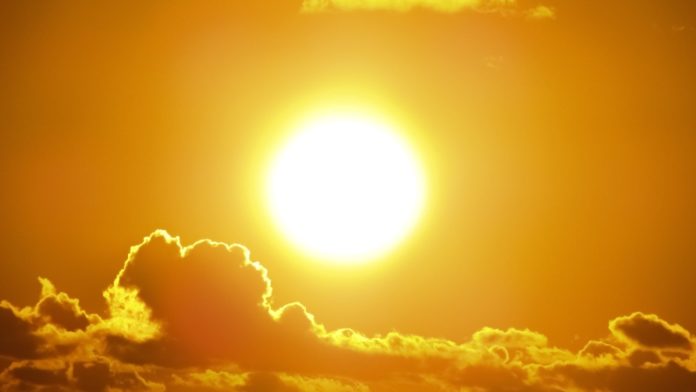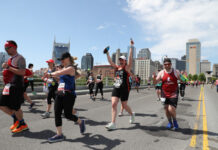With many areas of Middle Tennessee facing extreme temperatures and summer heat and humidity elsewhere, the American Heart Association, a global force for longer, healthier lives for all, is urging people to take extra steps to protect their hearts. Precautions are especially important for older adults and individuals with high blood pressure, obesity or a history of heart disease and stroke.
Temperatures over 100 or even temperatures in the 80s with high humidity can cause a dangerous heat index that can be hard on the heart. Recent research published in Circulation, the flagship journal of the American Heart Association, found that when temperatures reach extremes of an average daily temperature of 109 degrees Fahrenheit, the number of deaths from cardiovascular disease may double or triple. Another study, featured at the American Stroke Association’s International Stroke Conference, suggests that the more temperatures fluctuate during the summer, the more severe strokes may become.
In hot weather, the body tries to cool itself by shifting blood from major organs to underneath the skin. This shift causes the heart to pump more blood, putting it under significantly more stress.
“If you’re a heart patient, older than 50, or overweight, the American Heart Association suggests you take special precautions in the heat to protect yourself,” said Dr. Daniel Muñoz, President of the Greater Nashville American Heart Association Board of Directors and Executive Medical Director of Vanderbilt Heart and Vascular Institute.
“Some heart medications like angiotensin receptor blockers (ARBs), angiotensin-converting enzyme (ACE) inhibitors, beta blockers, calcium channel blockers and diuretics, which affect blood pressure responses or deplete the body of sodium, can exaggerate the body’s response to heat and cause you to feel ill in extreme heat,” added Muñoz. “But don’t stop taking your prescriptions. Learn how to keep cool and talk to your doctor about any concerns.”
Even if you aren’t taking medications for a heart condition, it is important to take precautions in the heat. While infants and the elderly are more vulnerable to problems from heat, extreme temperatures can cause health issues for anyone.
“Staying hydrated is key. It is easy to get dehydrated even if you don’t think you’re thirsty,” Muñoz said. “Drink water before, during and after going outside in hot weather. Don’t wait until you feel thirsty. And the best way to know if you are getting enough fluid is to monitor your urine output and make sure the urine color is light-colored and clear, not dark or concentrated.”
Dehydration causes the heart to work harder, putting it at risk. Hydration helps the heart more easily pump blood through the blood vessels to the muscles. And it helps the muscles work efficiently.
The American Heart Association suggests that everyone follows these top 5 hot weather precautions:
- Watch the clock: It’s best to avoid the outdoors in the early afternoon (about noon to 3 p.m.) because the sun is usually at its strongest, putting you at higher risk for heat-related illnesses.
- Dress for the heat: Wear lightweight, light-colored clothing in breathable fabrics such as cotton, or a newer fabric that repels sweat. Add a hat and sunglasses. Before you get started, apply a water-resistant sunscreen with at least SPF 15, and reapply it every two hours.
- Drink up: Stay hydrated by drinking a few cups of water before, during and after going outside or exercising. Avoid caffeinated or alcoholic beverages.
- Take regular breaks: Find some shade or a cool place, stop for a few minutes, hydrate and start again
- Follow the doctor’s orders: Continue to take all medications as prescribed.
It’s important to know the signs and symptoms when you may be experiencing too much heat.
Symptoms of heat exhaustion:
- headaches
- heavy sweating
- cold, moist skin, chills
- dizziness or fainting (syncope)
- a weak and rapid pulse
- muscle cramps
- fast, shallow breathing
- nausea, vomiting or both
If you experience these symptoms, move to a cooler place, stop exercising and cool down immediately by dousing yourself with cold water and re-hydrating. You may need to seek medical attention.
Symptoms of heat stroke:
- warm, dry skin with no sweating
- strong and rapid pulse
- confusion and/or unconsciousness
- high fever
- throbbing headaches
- nausea, vomiting or both
If you experience these symptoms, seek medical attention right away. Heat stroke is not the same as a stroke. Stroke happens when a blood vessel to the brain either bursts or is blocked by a clot, causing a decrease in oxygen flow to the brain.
Additional Resources:
- Extreme high temperatures may double or triple heart-related deaths
- Swings in daily temperature may affect stroke severity
- Summer heat risks for pregnant women
- How to stay active in hot weather
- How much water do you need?
- Protect your heart during the dog days of summer
- Infographic on heat stroke vs. stroke
About the American Heart Association
The American Heart Association is a relentless force for a world of longer, healthier lives. We are dedicated to ensuring equitable health in all communities. Through collaboration with numerous organizations, and powered by millions of volunteers, we fund innovative research, advocate for the public’s health and share lifesaving resources. The Dallas-based organization has been a leading source of health information for nearly a century. Connect with us on heart.org, Facebook, Twitte


















